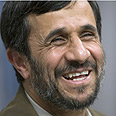

Russia has begun delivering S-300 air defense systems to Iran which could help repel any Israeli and US air strikes on its nuclear sites, the official IRNA news agency reported on Sunday.
"After few years of talks with Russia ... now the S-300 system is being delivered to Iran," IRNA quoted Email Kosari, deputy head of parliament's Foreign Affairs and National Security committee, as saying.
Kosari did not say when the deliveries began. Iran's Foreign Ministry declined to comment on the report.
Last week Amos Gilad, head of the Israeli Defense Ministry's Security-Diplomatic Bureau, landed in Moscow to convey Israel's opposition to the deal. While in Russia, Gilad was also expected to address the possible sale of weapons to Syria and the flow of arms through Syria to Hizbullah terrorists in Lebanon.
The United States, its European allies and Israel say Iran is seeking to build nuclear arms under the cover of a civilian atomic energy program. Iran denies the charge.
Israel's insistence that Iran must not be allowed to develop an atomic bomb has fueled speculation that the Jewish state, widely assumed to have the Middle East's only nuclear arsenal, could mount its own pre-emptive strikes.
'No capability to make nuclear weapons'
In October Russia's Foreign Ministry denied media speculation that Moscow would sell the medium-range S-300 system, adding Moscow had no intention of selling weapons to "troubled regions."
But Russia's RIA news agency last week quoted "confidential sources" as saying that Russia was fulfilling a S-300 contract with Iran.
The most advanced version of the S-300 system can track targets and fire at aircraft 120 km (75 miles) away. It is known in the West as the SA-20.
Russian arms sales and nuclear cooperation with Iran have strained relations with Washington, which says Tehran could use them against their interests in the region and also against its neighbors.
Russia, building Iran's first nuclear power plant in the southern port city of Bushehr, says Tehran does not have the capability to make nuclear weapons.
Ali Waked contributed to this report















